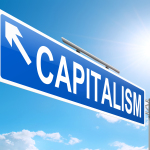
The perception of “capitalism” as a branded system that benefits most of us has seriously declined recently, with a widespread, growing lack of trust and relevance, especially among Millennials. The main cause of this tarnished brand image is the great recession and the extensive distrust of the banking and financial service industry. However, there are constructive ways that business leaders can restore trust in capitalism and their companies.
A recent article in the Economist entitled “Capitalism’s Reputation Has Been Damaged by the Bankers” shed light on some fundamental societal trends and issues. These include increasing income inequality, concerns over “fairness,” declining trust in our basic institutions, and questioning the basic principles behind property ownership and competition. These issues have contributed to a growing perception of capitalism as a system that benefits other more select people, but not us.
Webster’s dictionary defines a capitalist as “a person who has a lot of money and property, and who uses those things to produce more money.” The typical image of a capitalist is a plutocrat with a top hat dating back to the 19th century and who personifies the capitalism system that has traditionally generated wealth for many. However, this brand image is becoming more difficult for most people to relate to or trust today, as they don’t have as much property or money, and very few can live directly off profits. From a branding perspective, where branding is essentially about creating a bond with people based on shared values and interests, this trend is alarming.
The recent financial recession is a major cause of this increasingly skeptical view of capitalism. Personally, I grew up a big fan of capitalism, proudly wearing my “Tuck Tycoon” tee shirt from business school years ago at Dartmouth, with the slogan “God Bless Free Enterprise” surrounding a dollar sign. Later, the steady economic growth and increasing real wages in the 1980’s and 1990’s resulted in political parties shifting their policies more to the center right and adopting market-friendly policies.
While no one would argue against the right to own property or the inherent virtues of competition–both central components of capitalism–its brand image today is more associated with the banking sector. Traditionally, investment banking has attracted the best and the brightest from top schools, but it is less appealing today. It is very hard for common people to understand and relate to such complex andsophisticated financial instruments or models branded with strange acronyms, especially in comparison to popular consumer products that improve our lives such as iPads and other technological advances. Furthermore, the move by government to save these “too big to fail” banks has undermined the idea and benefits of a free market. Indeed, it is hard to justify a system (i.e. capitalism) that privatizes profits and nationalizes losses.
The populist reaction? It’s just not fair. This distrustful brand image of capitalism is widespread, and supported by several polls:
- Only 54% of Americans in 2013 had a positive view of the term “capitalism”
- 56% of people in rich countries see “inequality” as unfair and a major problem, in light of the expanding riches among the few. In a 2011 study by the CBO, the top earning 1% of US households increased their income by 275% between 1979 and 2007, compared to a gain of under 40% for the middle income class.
- The 2014 Edelman Trust Barometer indicated that the least trusted industries globally were Banks and Financial Services (only 51% and 50 %), while the most trusted were Technology and Consumer Electronics (79% and 75%)
- Reflecting this low trust, 49% Americans felt there was not enough regulation for Financial Services, compared to 30% for business in general
So how can business leaders improve this tarnished image of capitalism, especially in the financial service industry? The key is to change the current perception of capitalism so that more average Americans can relate to this brand, going beyond the merits of private property and competition. Edelman Research indicates that 84% of people believe a company can take specific actions that both increase profits and improve the economic and social conditions in their local communities. In particular, Edelman suggests five performance clusters of attributes that are essential for re-building the brand trust for capitalism:
- Engagement – listening to customers, treats employees well, puts customers ahead of profits, and communicates frequently and honestly
- Integrity – improving the ethical, address issues/crises, transparency and openness
- Products & Services – high quality products/services, innovates for new products
- Purpose – protects/improves environment, addresses society’s needs, creates programs that positively impact the local community, partners with third parties to address societal needs
- Operations – highly regarded leadership, a top global company, consistent financial returns
Those surveyed by Edelman feel that Engagement, Integrity and Purpose are trust drivers that are under performing. Importantly these are the drivers that especially motivate Millennials, who represent the fastest growing and highest potential consumer group over the next 10 years. In short, there is a big opportunity for business leaders to balance economic values and social branding to improve this troubled image of capitalism, especially among Millennials, and restore a trustful relationship with the common people.
This article was syndicated from Business 2 Community: Why “Capitalism” Must be Re-Branded – and How
More Sales & Marketing articles from Business 2 Community:





